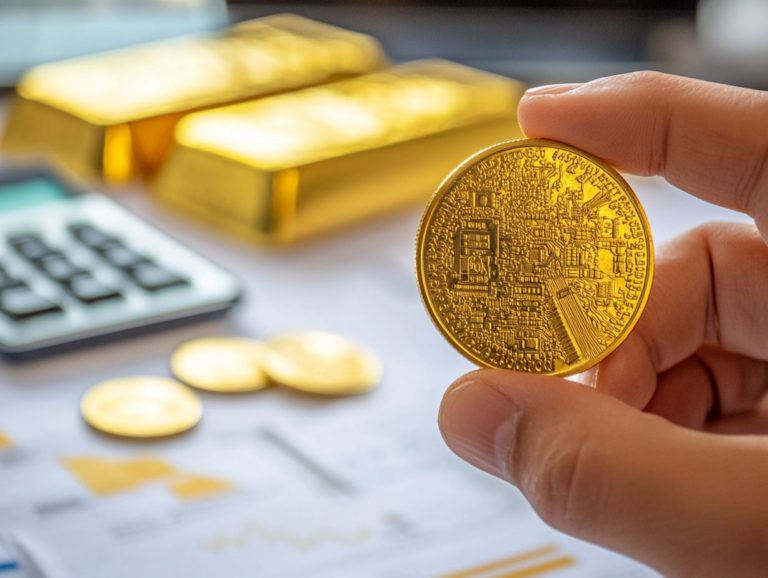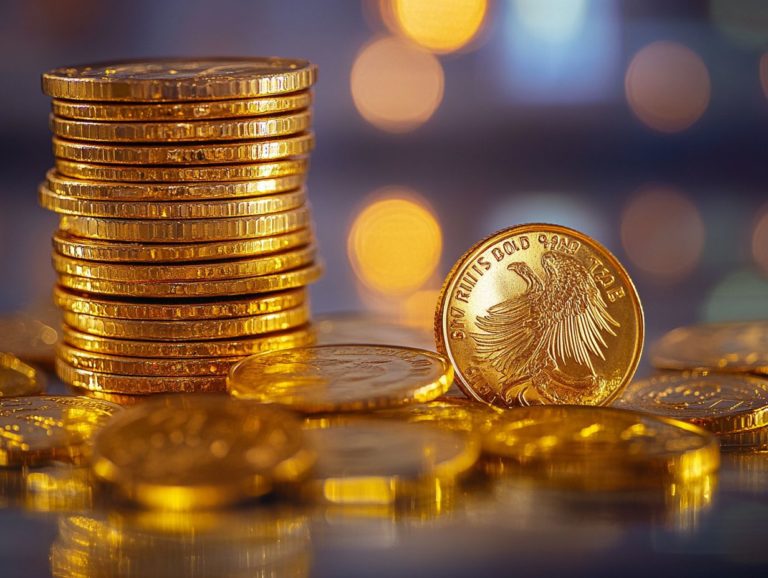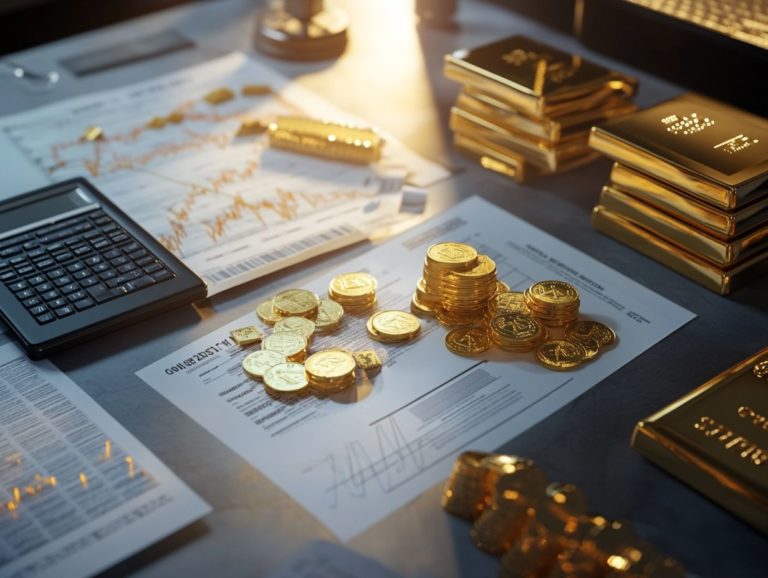Gold Investment Trends in Emerging Economies
Gold has long been viewed as a safe haven asset, especially in emerging economies where economic volatility prompts investors to seek stability.
Discover the exciting historical trends in gold investment in these regions! This article examines the factors that drive demand and their implications for economic growth. It assesses the current landscape of gold investment, highlights the leading emerging markets, and explores the challenges and opportunities that await.
With forward-looking predictions and practical strategies for risk management, this guide equips you with the insights necessary to confidently navigate the gold investment terrain in emerging economies.
Contents
- Key Takeaways:
- Defining Emerging Economies
- Historical Trends of Gold Investment in Emerging Economies
- Current State of Gold Investment in Emerging Economies
- Future Outlook for Gold Investment in Emerging Economies
- Tips for Investing in Gold in Emerging Economies
- Frequently Asked Questions
- What are some current trends in gold investment in emerging economies?
- Why are emerging economies turning to gold investment?
- What are some factors driving gold investment in emerging economies?
- What challenges come with investing in gold in emerging economies?
- What benefits can investors expect in emerging economies?
- What risks should investors be aware of?
Key Takeaways:

- Gold is a valuable investment option in emerging economies. Economic growth and diversification make gold a popular choice for investors.
- Top emerging economies for gold investment include China, India, and Russia. These countries have strong demand for gold and are expected to continue driving growth in the market.
- Gold investment in emerging economies looks bright and full of opportunities! Predictions indicate that this market will thrive, offering chances for investors to diversify their portfolios and manage risk.
Defining Emerging Economies
Emerging economies are countries undergoing rapid growth and industrialization. They are marked by increasing engagement in global markets and significant changes in economic policies. Nations like China, India, and Turkey often face distinct challenges, such as inflation and political issues, impacting their economic stability and investment landscapes.
As their middle class expands and incomes rise, new investment opportunities arise, particularly in assets like gold. This precious metal acts as a hedge against inflation and currency fluctuations. During uncertain times, global demand for gold tends to surge. Grasping these dynamics is crucial for spotting promising investment prospects.
Historical Trends of Gold Investment in Emerging Economies
Historically, investing in gold within emerging economies has shown considerable fluctuations. These trends are influenced by factors like economic policies, inflation rates, and geopolitical events. Nations like China and India have developed robust gold markets over the years, driven by cultural reverence for gold and significant demand for jewelry and gold bars.
Central bank purchases and strategic initiatives aimed at enhancing gold reserves have further bolstered this dynamic. These evolving trends have significantly influenced the quarterly gold market, highlighting the importance of gold price trends and demonstrating gold’s enduring resilience as an investment option amid the volatility and economic shifts characteristic of emerging markets.
Factors Driving Gold Investment
Several factors influence your gold investment decisions in emerging economies. These include inflation rates, fluctuations in the US dollar, and political issues that create market uncertainty. Gold serves as a safe haven, especially in countries facing inflationary pressures or currency devaluation, leading to increased demand for bars and coins.
Speculative investors may seize market trends, further shaping gold price dynamics as they navigate the ever-evolving economic landscape.
Consider nations like Turkey and Argentina, where rampant inflation drives citizens to seek refuge in gold as their local currencies lose value. The strength of the US dollar and its impact on purchasing power dictate the urgency to invest in gold.
When currency fluctuations catch your attention, you may find yourself increasing gold holdings as a risk mitigation strategy.
Over time, shifts in consumer sentiment and economic policies amplify these behaviors, weaving a complex tapestry of motivations that influences overall gold demand.
Impact on Economic Growth

Gold investment significantly impacts economic growth in emerging economies. It acts as a secure store of value and boosts financial stability. The rising demand for gold bars and coins signals a growing interest in this precious metal as an investment, which can lead to increased money coming into the country and strengthen the economic foundations of nations.
Central banks in these countries ramp up their gold reserves. This solidifies gold’s position as a stabilizing force within their financial systems, promoting long-term economic advancement.
These dynamics are evident in various nations. A notable uptick in gold purchases particularly bars and coins mirrors investor confidence amid economic uncertainty. Recent statistics indicate that global demand for gold bars and coins has hit record highs, as consumers seek refuge from volatile currency fluctuations.
For instance, in 2022, central bank purchases of gold soared to over 1,000 tons. This underscores their strategy to bolster national reserves. This accumulation enhances liquidity and offers a protective shield against inflationary pressures, enabling emerging markets to navigate their developmental challenges more effectively.
Current State of Gold Investment in Emerging Economies
The current landscape of gold investment in emerging economies reveals a nuanced interplay of market dynamics. Factors like ETF outflows and evolving investment patterns in Asia, especially in China and India, are at play.
Investors are increasingly diversifying their portfolios, seeking gold as a reliable hedge against economic uncertainty, inflation, and currency devaluation. While gold prices may fluctuate, the demand for gold investment persists, highlighting its enduring significance within the financial ecosystem of emerging markets. To identify the right opportunities, it’s important to recognize 5 signs of a good gold investment opportunity.
Top Emerging Economies for Gold Investment
Several emerging economies are prime candidates for gold investment, with China, India, Turkey, and Ghana leading the pack. Each country offers unique dynamics that shape its gold market.
In China, gold has cultural significance and drives demand for jewelry. This fuels a burgeoning investment landscape. In India, gold transcends mere investment; it symbolizes prosperity and is often gifted during celebrations, ensuring consistent high demand. For those considering entering this market, following the 5 steps to investing in gold responsibly can help navigate the complexities.
Turkey presents a different scenario. The fluctuating currency and economic uncertainty have prompted many to view gold as a safe haven asset, significantly boosting interest in purchases. Meanwhile, Ghana, rich in natural resources, is increasingly attracting foreign direct investment, indicating its gold industry is maturing.
As these countries navigate global market shifts, they adapt to new regulations and the rise of digitalization, reshaping how gold is traded and valued.
Challenges and Opportunities
Investing in gold in emerging economies presents both challenges and opportunities. Geopolitical tensions and inflationary pressures significantly sway investor sentiment. While soaring inflation rates and unstable currencies may pose risks, they simultaneously open up unique prospects for gold investment, as individuals and institutions gravitate toward safe-haven assets.
Nations grappling with political unrest or facing economic sanctions often see increased demand for gold. It is perceived as a safeguard against currency devaluation. On the flip side, inflation can diminish purchasing power, driving investors toward gold as a reliable hedge.
Recent examples from countries in crisis showcase how gold prices can spike amid uncertainty. These situations highlight the influence of geopolitical tensions and economic indicators, enhancing the appeal of gold investment while dictating the behaviors of various investors who are aware of the intricate balance between risk and reward in volatile markets. For those interested, exploring notable trends in gold investment strategies can provide valuable insights.
Future Outlook for Gold Investment in Emerging Economies

Get ready! The future of gold investment in emerging economies is bright and full of opportunities, with projections hinting at sustained demand fueled by increasing investment interest and changing market dynamics.
As these nations navigate inflation, currency fluctuations, and global conflicts, gold is set to uphold its reputation as a favored asset for diversification.
Insights into upcoming trends suggest that as economic stability rises and the middle class expands, you’ll find even more compelling gold investment opportunities across a range of emerging markets.
Predictions and Projections
Predictions for gold investment in emerging markets indicate a promising upward trend in demand, driven by economic challenges and an increasing recognition of gold as a reliable hedge. You ll find that both retail and institutional investors are ramping up their interest in gold, eager to diversify their portfolios and manage risks in an unpredictable global landscape.
This momentum is expected to grow, particularly with anticipated global conflicts and fluctuating economic indicators that have historically influenced gold price dynamics.
Emerging markets are poised to play a crucial role in shaping the future of gold, especially as local currencies grapple with instability and inflation becomes an ever-pressing concern.
As wealth increases in these regions, you can expect a surge in gold purchases, particularly in nations with a deep-rooted cultural affinity for the metal.
Central banks in these emerging economies may also look to bolster their gold reserves as a strategic move to enhance financial security, creating an environment that could drive gold prices even higher.
As infrastructure development and urbanization continue to rise, the demand for gold jewelry and electronics is set to increase, solidifying gold’s position as both a safe haven and a valuable asset in global investment discussions. For those considering retirement, exploring strategies for precious metals can be beneficial.
Tips for Investing in Gold in Emerging Economies
Investing in gold within emerging economies demands a strategic mindset that prioritizes risk management and diversification, specifically tailored to the distinct market conditions you ll encounter.
It s essential to take into account local regulations, economic fundamentals, and geopolitical contexts to make well-informed decisions. By blending traditional investment approaches with innovative strategies, you can adeptly navigate the complexities of emerging markets while maximizing your potential returns on gold investments.
Risk Management and Diversification Strategies
Effective risk management and diversification strategies are essential for your successful gold investment in emerging economies, particularly given the current market volatility and economic unpredictability.
You should be aware that the gold market can be swayed by global economic shifts, currency fluctuations, and global conflicts. By strategically allocating your assets across various gold formats such as exchange-traded funds (ETFs), bullion bars, and even collectible jewelry you can effectively spread potential risks.
Engaging with international markets not only allows you to hedge against localized economic issues but also strengthens your overall portfolio.
For instance, a savvy investor like you might consider holding both physical gold in a stable economy and gold-linked equities in a more volatile region. This approach enables you to balance risk while capitalizing on potential market rewards.
Frequently Asked Questions

What are some current trends in gold investment in emerging economies?
One current trend is the increasing demand for physical gold in countries like China and India, as well as other emerging markets.
Why are emerging economies turning to gold investment?
Emerging economies often have volatile currencies and weak financial systems, making gold a more stable and reliable investment option.
What are some factors driving gold investment in emerging economies?
Global economic uncertainty and political instability are increasing gold investments in these regions.
What challenges come with investing in gold in emerging economies?
Investors face challenges like poor trading infrastructure and limited access to information. They might also encounter illegal or fraudulent activities.
What benefits can investors expect in emerging economies?
Benefits include spreading out investments, protecting against inflation, and potentially achieving higher returns.
What risks should investors be aware of?
Every investment carries risks. Price fluctuations, political instability, and scams are all concerns. Do your homework before investing in gold!















